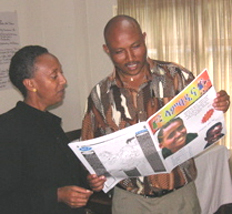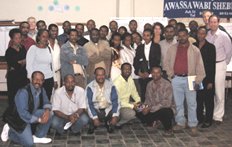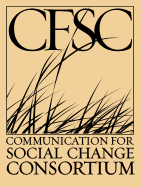|
|
|
 |
|
Participants in CFSC workshop, Awassa, Ethiopia, August 2005
Photo by Ailish Byrne |
|
|
| CFSC Consortium Body of Knowledge |
Are you looking for articles, books, essays, journals or reports on communication for development and social change? Is your interest HIV/AIDS, human rights or rural development? No matter what your issue, as long as it deals with communication for social change, you should be able to find useful references in the Body of Knowledge, the CFSC Consortium’s searchable database.
The body of knowledge has more than 3,000 references from around the world now registered. We invite you to consult the database for your use. And we encourage you to submit any reference you consider relevant to helping our database continue to grow. |
 |
| Inviting Artistic Images, Songs, Poetry Showing CFSC In Action |
Mazi invites your original images showing communication for social change in action. Whatever your medium"”photography, painting, sketches, mosaics, murals, songs or dances"”if you have an image showing people working together to give everyone a voice"”we will consider publishing it in our online magazine. Unfortunately, we are unable to return your submission. We also reserve the right to crop and/or edit your work for style and content. Each creator will be credited online for his or her submission.
Please e-mail your contribution to mazi@communicationforsocialchange.org |
 |
| Inviting Guest Contributors |
Do you know of interesting examples of successful applications of communication for social change principles within your community or country?
Mazi is looking for good case stories of CFSC at work: illustrations of the process of dialogue leading to community decision-making, action, implementation, monitoring, assessment and evaluation. We’re especially interested in examples of how communication processes have been strengthened or established at a community level by people who have been traditionally marginalized.
Help all of us build a better understanding of the many and varied ways that public dialogue leads to community decision-making and action. Describe for us where it takes place and why. Explain how CFSC is working. Inspire us all by telling us your community’s story.
Please e-mail your contribution of at least 250 words to mazi@communicationforsocialchange.org
Please make sure your story includes the CFSC elements: catalyst or catalytic event, problem identification, dialogue, decision-making, community action, monitoring and evaluation, and assessment of change at the individual and societal levels. Include your name, phone number, fax (if available) and email address.
The facts of all submissions will be verified. Once verified, they may be included either in Mazi or on the Consortium’s website. |
 |
|
|
 |
|
Participants in CFSC workshop, Awassa, Ethiopia, August 2005
Photo by Jim Hunt |
|
|
 |
|
Workshop participants and facilitators
Photo courtesy of Jim Hunt |
|
|
|
|
Happy Birthday, Mazi: We Have a Lot of Work Ahead
Message from Denise Gray-Felder |
As Mazi celebrates its first year anniversary, CFSC Consortium President Denise Gray-Felder reflects on the work ahead using communication to help reduce poverty.
Welcome to Mazi No. 5. It has been one year since we launched Mazi during a cold, wintry holiday weekend in the United States. Since then, we've doubled our readership and received an outpouring of good suggestions and story ideas from our readers. Thank you for your loyalty and ongoing support. Please keep the ideas coming and share this issue with a friend or colleague. We aim to triple, or even quadruple, our readership, and our influence in 2006 and beyond.
I find myself at this time of year pausing to reflect a bit on how I spend my professional and personal time. Each year I tell myself: "slow down and enjoy the holidays." Each year I do not.
My normal work days are spent dashing mentally and literally from one "pressing demand" to another, far too infrequently squeezing in time for analysis and contemplation about how our work is going, how it might be better and, most importantly, how I might relate more effectively with the people who are the Consortium. Dialogue"”a core component of the communication for social change process"”is too often between my computer screen and me. For me, collective action means gathering written input from staff and consultants scattered about the globe and trying to make sense of it all. Monitoring and evaluation of my work is often virtual"”and reflection, well, I've already admitted there is limited time for true self-evaluation. |
 |
| Why the Media Matter: Ensuring the World's Poorest People Have a Say |
| In October 2005, James Deane, the Consortium's managing director, strategy, spoke at the Global Forum for Media Development, which took place in Amman, Jordan. In this excerpt, edited specially for Mazi, he discusses fast-moving global trends shaping today's media landscape"”and the role of media in helping people improve their lives. |
 |
| Dissemination vs. Dialogue: A False Dichotomy |
| Arvind Singhal, Ph.D., is a professor and presidential research scholar
at the School of Communication Studies, Ohio University, where he teaches and conducts research in diffusion of innovations, mobilising for change, design and implementation of strategic communication, and entertainment-education communication. Singhal argues here that dissemination of information and dialogue are not mutually exclusive. In fact, they can complement each other effectively when it comes to bringing about sustainable social change. Author of eight books, his latest work is Organising for Social Change (Sage, 2006). |
 |
| Communicating the Plight of 'Untouchable' Children in Nepal |
Photo essay by Alex Mavrocordatos
During 1999 and 2000 Alex Mavrocordatos, of cdcArts, and Ann Shrewsbury, of Small World Theatre, trained some 30 Nepali street performers, development workers and local community members in Participatory Performance Practices (PPP). The trainees were encouraged to develop their own version of the practices.
|
 |
| Using Street Theatre for Health Education in Niger's Villages |
Photo essay by Dominique Thaly
Reseau des Arts Vivants pour le Developpement, a Niger-based nonprofit organization, uses forum theatre to engage local people in dialogue about the dangers of early marriages and pregnancy in young girls. The phototgrapher, CFSC consultant Dominique Thaly, works with this organization to organize and stage forum theatre and to use the resulting theatre discussions to sustain ongoing information and discussion activities with both women and men in Niger. |
 |
| To Change the Dance You Must Change the Music: Youth Programmes in Ethiopia Aimed at HIV/AIDS |
Before I was a member of a Youth Association I had no awareness about HIV/AIDS. I didn't even believe in the existence of HIV/AIDS. I actively practiced unsafe sex with many women, due to the influence of alcohol and drug addiction"¦. [After joining] I started participating and following all HIV/AIDS prevention programme activities, specifically the Community Conversations. I started open discussion with my friends"¦. I began to protect myself and was concerned to know my status"¦. I moved away from drug abuse"¦ and [now] I spend my time doing drama and creative, positive things on HIV/AIDS. The changes"¦ helped me to be a model to other friends of mine and I developed discussion with my family and other community [members].
Excerpted from a letter from Dawit, a 24-year-old Ethiopian man following a CFSC workshop held in August 2005.
In this article, the Consortium's Ailish Byrne, senior associate, research and evaluation, and Jim Hunt, senior adviser, describe communication for social change in progress with youth programmes in Ethiopia. These youth dialogue programmes provide young people forums to discuss HIV/AIDS and encourage them take an active role in preventing the spread of the virus. The article also explains how participatory monitoring and evaluate of such programs is essential.
|
 |
| Men and Traditions Against AIDS |
| Jemimah Mwakisha, a Ph. D. candidate at State University of New York, Binghamton, describes how an NGO facilitated a three-generational dialogue about transmission of HIV/AIDS and how existing, or changing, traditions can save lives. |
 |
| Kibera Field Centre Uses Innovative Programmes to Create Public Dialogue About Health Issues |
| Jemimah Mwakisha, a Ph. D. candidate at State University of New York, Binghamton, describes CFSC in action in one of Africa's biggest slums. |
 |
| The Racial Aftermath of Hurricane Katrina |
| Throughout the world, whenever a natural disaster strikes, people who are poor and marginalised often suffer most. Consortium Board Member Dayna L. Cunningham, of Public Interest Projects, a social justice project-management organisation, writes about the insensitivity and incompetence surrounding response efforts after Hurricane Katrina. She argues for the CFSC approach by showing the critical importance of listening to the people most affected by poverty and injustice. |
 |
| CFSC Resources Available |
Who Measures Change: An Introduction to Participatory Monitoring and Evaluation of Communication for Social Change by Will Parks. South Orange, N.J.: Communication for Social Change Consortium Inc., 2005.
Measuring Change; A Guide to Monitoring and Evaluation of Communication for Social Change, ed. by Ailish Byrne with Denise Gray-Felder, Jim Hunt and Will Parks. South Orange, N.J.: Communication for Social Change Consortium Inc., 2005. This is an abridged version of the the longer Parks book.
Communities Measure Change: A Reference Guide to Monitoring Communication for Social Change, developed by CFSC Consortium, 2005.
This is a poster sized at-a-glance reference for use with community-based CFSC training sessions and is not intended to be a stand-alone document. Contact the CFSC Consortium for information on training and this reference guide.
Making Waves: Stories of Participatory Communication, ed., Alfonso Gumucio-Dagron. New York, N.Y.: Rockefeller Foundation, 2001. Available in English, French and Spanish. Limited availability.
Communication for Social Change Consortium brochure. Available in English, French and Spanish.
Communication for Social Change Anthology, Alfonso Gumucio-Dagron and Thomas Tufte, ed. South Orange, N.J.: Communication for Social Change Consortium Inc. |
 |
| Useful Links |
http://www.dfid.gov.uk/pubs/files/aids-communication.pdf
The U.K.'s Department for International Development has issued new HIV/AIDS communication guidelines. In recognizing "a shift away from"¦changing behaviour"¦towards a stronger emphasis on rights to education and information, community participation and dialogue, DFID signals its recognition of the communication for social change approach."
http://www.portalcomunicacion.com
El Portal de la Comunicación del Instituto de la Comunicación de la UAB [+], inaugurado en marzo de 2001, ofrece información y documentación especializada en los diferentes aspectos de la comunicación, orientada a los investigadores, estudiantes y profesionales de la Comunicación, prioritariamente de América Latina, España y Cataluña.
Desde su puesta en línea el Portal de la Comunicación se ha constituido en mediador y punto de referencia en Internet para todas aquellas personas interesadas en los estudios sobre medios de comunicación, sociedad de la información, tecnologías de la información y comunicación (TIC), y sus repercusiones e influencias en la organización social.
The Communication Portal of the UAB's Institute of Communication, which went live in March 2001, offers specialised documentation and information on various aspects of communication. It is for communication researchers, students and professionals, above all from Latin America, Spain and Catalonia.
|
| Updates and Announcements |
1. The World Congress meeting dates have changed from March 2006 to October 25-27, 2006. Location: FAO headquarters in Rome. The change comes at the request of the Italian government and World Bank officials.
2. The Latin American Cinema and Video Council of the Indigenous Peoples invites individuals and organizations that produce, encourage and distribute cinema and video productions made by indigenous peoples to participate in their eighth annual contest. For more information and to send film and video productions, contact:
CLACPI / Ojo de Agua Comunicación
Segunda Cerrada de Macedonio Alcalá 211-A
Colonia Díaz Ordaz
C. P. 68040
Oaxaca, Oaxaca,
Mà‰XICO
http://www.clacpi.org/html/VIIIfestival1.htm |
|










